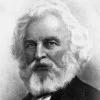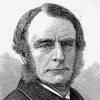If grace be grace, and Allah gracious be,
Adam from Paradise why banished He?
Grace to poor sinners shown is grace indeed;
In grace hard earned by works no grace I see.Omar Khayyám (1048-1123) Persian poet, mathematician, philosopher, astronomer [عمر خیام]
Rubáiyát [رباعیات], [tr. Whinfield (1883), # 102]
(Source)
While numbered as # 102 in most locations, it is given as # 57 here.
I was unable to find alternate translations or analogs to this quatrain from Whinfield. The closest (but a bit of a stretch):If sinfully I drudge, where is Your mercy?
If clouds darken my heart, where is Your light?
Heaven rewards my practice of obedience;
Rewards well-earned are good -- but what of grace?
[tr. Graves & Ali-Shah (1967), # 86]
Quotations about:
works
Note not all quotations have been tagged, so Search may find additional quotes on this topic.
Thoze people who are trieing to git to heaven on their kreed will find out at last that they didn’t hav a thru ticket.
[Those people who are trying to get to heaven on their creed will find out at last that they didn’t have a through ticket.]
Josh Billings (1818-1885) American humorist, aphorist [pseud. of Henry Wheeler Shaw]
Josh Billings’ Trump Kards, ch. 9 “The Ram and Crawfish” (1874)
(Source)
Goodness is about what you do. Not who you pray to.
The difference between a man of genius seen in his works and in person, is like that of a lighthouse seen by night and by day, — in the one case only a great fiery brain, in the other only a white tower.
Believe me, it is not length of time spent in prayer that brings a soul benefit: when we spend our time in good works, it is a great help to us and a better and quicker preparation for the enkindling of our love than many hours of meditation.
Teresa of Ávila (1515-1582) Spanish mystic, poet, philosopher, saint
Foundations, ch. 5 “On Prayer” [tr. Peers]
(Source)
Alternative translations:And let souls believe me that it is not the length of time spent in prayer that benefits one; when the time is spent as well in good works, it is a help in preparing the soul for the enkindling of love. The soul may thereby be better prepared in a very short time than through many hours of reflection.
[tr. Kavanaugh / Rodriguez]And, believe me, it is not the length of time which makes a soul advance in prayer, but when being called to other works by obedience and charity, they do these duties well, then (as I have said) the soul advances so much, that in a very short time she is better prepared for enkindling within her the love of God, than (wanting in those works) she would be by spending many hours in meditation.
[tr. Dalton]But believe me, what helps a soul to advance is not the spending long hours in prayer, but it is a great help to be employed also in active works, so that the soul is better disposed to enkindle its love in a very short space of time than by spending many hours in meditation.
[tr. Mason]
One must not always think so much about what one should do, but rather what one should be. Our works do not ennoble us; but we must ennoble our works.
Meister Eckhart (c. 1260-1328?) German theologian, philosopher, mystic [a.k.a. Johannes Eckhart von Hochheim; Eckhart; Eckehart]
Work and Being (14th C.)
Note: I haven't found a text by that name in Eckhart's bibliography, nor this quotation anywhere connected with anything but that title or none at all.
If a man who was rich enough in this world’s goods saw that one of his brothers was in need, but closed his heart to him, how could the love of God be living in him? My children, our love is not to be just words or mere talk, but something real and active.
[ὃς δ’ ἂν ἔχῃ τὸν βίον τοῦ κόσμου καὶ θεωρῇ τὸν ἀδελφὸν αὐτοῦ χρείαν ἔχοντα καὶ κλείσῃ τὰ σπλάγχνα αὐτοῦ ἀπ’ αὐτοῦ πῶς ἡ ἀγάπη τοῦ Θεοῦ μένει ἐν αὐτῷ. Τεκνία μὴ ἀγαπῶμεν λόγῳ μηδὲ τῇ γλώσσῃ ἀλλὰ ἐν ἔργῳ καὶ ἀληθείᾳ.]
The Bible (The New Testament) (AD 1st - 2nd C) Christian sacred scripture
1 John 3:17-18 [JB (1966)]
(Source)
(Source (Greek)). Alternate translations:But whoso hath this world's good, and seeth his brother have need, and shutteth up his bowels of compassion from him, how dwelleth the love of God in him?
My little children, let us not love in word, neither in tongue; but in deed and in truth.
[KJV (1611)]If we are rich and see others in need, yet close our hearts against them, how can we claim that we love God? My children, our love should not be just words and talk; it must be true love, which shows itself in action.
[GNT (1976)]If anyone is well-off in worldly possessions and sees his brother in need but closes his heart to him, how can the love of God be remaining in him? Children, our love must be not just words or mere talk, but something active and genuine.
[NJB (1985)]But if someone has material possessions and sees a brother or sister in need but refuses to help—how can the love of God dwell in a person like that?
Little children, let’s not love with words or speech but with action and truth.
[CEB (2011)]If anyone has material possessions and sees a brother or sister in need but has no pity on them, how can the love of God be in that person? Dear children, let us not love with words or speech but with actions and in truth.
[NIV (2011)]How does God’s love abide in anyone who has the world’s goods and sees a brother or sister in need and yet refuses help?
Little children, let us love, not in word or speech, but in truth and action.
[NRSV (2021 ed.)]
The last business of Christ’s life was the saving of a poor penitent thief. That was part of His triumph. That was one of the glories attending His death.
Dwight Lyman "D. L." Moody (1837-1899) American evangelist and publisher
“The Penitent Thief” (sermon)
(Source)
Do not fancy, as too many do, that thou canst praise God by singing hymns to Him in church once a week, and disobeying Him all the week long. … Dost thou fancy as the heathen do, that God needs to be flattered with fine words? or that thou wilt be heard for thy much speaking, and thy vain repetitions? He asks of thee works as well as words; and more, He asks of thee works first and words after.
Charles Kingsley (1819-1875) English clergyman, historian, essayist, novelist (pseud. "Parson Lot")
The Good News of God, Sermon 4 “The Song of the Three Children (Daniel 3:16-18)” (1881)
(Source)
The monuments of wit and learning are more durable than the monuments of power, or of the hands. For have not the verses of Homer continued twenty-five hundred years or more, without the loss of a syllable or letter; during which time infinite palaces, temples, castles, cities have been decayed and demolished?
The Lord has redeemed all of us, all of us, with the Blood of Christ: all of us, not just Catholics. Everyone! “Father, the atheists?” Even the atheists. Everyone! And this Blood makes us children of God of the first class. We are created children in the likeness of God and the Blood of Christ has redeemed us all. And we all have a duty to do good. And this commandment for everyone to do good, I think, is a beautiful path towards peace. If we, each doing our own part, if we do good to others, if we meet there, doing good, and we go slowly, gently, little by little, we will make that culture of encounter: We need that so much. We must meet one another doing good. “But I don’t believe, Father, I am an atheist!” But do good: We will meet one another there.
Francis I (b. 1936) Argentinian Catholic Pope (2013- ) [b. Jorge Mario Bergoglio]
Homily (22 May 2013)
(Source)
We must be something in order to do something, but we must also do something in order to be something. The best rule, I think, is this: If we find it hard to do good, then let us try to be good. If, on the other hand, we find it hard to be good, then let us try to do good. Being leads to doing, doing leads to being. Yet below both as their common root is faith, — faith in God, in man, in ourselves, in the eternal superiority of right over wrong, truth over error, good over evil, love over all selfishness and all sin.
Anyone, then, who knows the right thing to do and fails to do it, commits sin.
[εἰδότι οὖν καλὸν ποιεῖν καὶ μὴ ποιοῦντι ἁμαρτία αὐτῷ ἐστιν.]
The Bible (The New Testament) (AD 1st - 2nd C) Christian sacred scripture
James 4:17 [NRSV (2021 ed.)]
(Source)
(Source (Greek)). Alternate translations:Therefore to him that knoweth to do good, and doeth it not, to him it is sin.
[KJV (1611)]Everyone who knows what is the right thing to do and doesn't do it commits a sin.
[JB (1966)]So then, if we do not do the good we know we should do, we are guilty of sin.
[GNT (1976)]Everyone who knows what is the right thing to do and does not do it commits a sin.
[NJB (1985)]It is a sin when someone knows the right thing to do and doesn’t do it.
[CEB (2011)]If anyone, then, knows the good they ought to do and doesn't do it, it is sin for them.
[NIV (2011 ed.)]
But there were some things I believed in. Some things I had faith in. And faith isn’t about perfect attendance to services, or how much money you put on the little plate. It isn’t about going skyclad to the Holy Rites, or meditating each day upon the divine. Faith is about what you do. It’s about aspiring to be better and nobler and kinder than you are. It’s about making sacrifices for the good of others — even when there’s not going to be anyone telling you what a hero you are.
Now when the Human One comes in his majesty and all his angels are with him, he will sit on his majestic throne. All the nations will be gathered in front of him. He will separate them from each other, just as a shepherd separates the sheep from the goats. He will put the sheep on his right side. But the goats he will put on his left.
Then the king will say to those on his right, ‘Come, you who will receive good things from my Father. Inherit the kingdom that was prepared for you before the world began. I was hungry and you gave me food to eat. I was thirsty and you gave me a drink. I was a stranger and you welcomed me. I was naked and you gave me clothes to wear. I was sick and you took care of me. I was in prison and you visited me.’
Then those who are righteous will reply to him, ‘Lord, when did we see you hungry and feed you, or thirsty and give you a drink? When did we see you as a stranger and welcome you, or naked and give you clothes to wear? When did we see you sick or in prison and visit you?’ Then the king will reply to them, ‘I assure you that when you have done it for one of the least of these brothers and sisters of mine, you have done it for me.’
Then he will say to those on his left, ‘Get away from me, you who will receive terrible things. Go into the unending fire that has been prepared for the devil and his angels. I was hungry and you didn’t give me food to eat. I was thirsty and you didn’t give me anything to drink. I was a stranger and you didn’t welcome me. I was naked and you didn’t give me clothes to wear. I was sick and in prison, and you didn’t visit me.’
Then they will reply, ‘Lord, when did we see you hungry or thirsty or a stranger or naked or sick or in prison and didn’t do anything to help you?’ Then he will answer, ‘I assure you that when you haven’t done it for one of the least of these, you haven’t done it for me.’ And they will go away into eternal punishment. But the righteous ones will go into eternal life.[Ὅταν δὲ ἔλθῃ ὁ υἱὸς τοῦ ἀνθρώπου ἐν τῇ δόξῃ αὐτοῦ καὶ πάντες οἱ ἄγγελοι μετ’ αὐτοῦ τότε καθίσει ἐπὶ θρόνου δόξης αὐτοῦ. καὶ συναχθήσονται ἔμπροσθεν αὐτοῦ πάντα τὰ ἔθνη καὶ ἀφορίσει αὐτοὺς ἀπ’ ἀλλήλων ὥσπερ ὁ ποιμὴν ἀφορίζει τὰ πρόβατα ἀπὸ τῶν ἐρίφων. καὶ στήσει τὰ μὲν πρόβατα ἐκ δεξιῶν αὐτοῦ τὰ δὲ ἐρίφια ἐξ εὐωνύμων.
Τότε ἐρεῖ ὁ Βασιλεὺς τοῖς ἐκ δεξιῶν αὐτοῦ Δεῦτε οἱ εὐλογημένοι τοῦ Πατρός μου κληρονομήσατε τὴν ἡτοιμασμένην ὑμῖν βασιλείαν ἀπὸ καταβολῆς κόσμου. ἐπείνασα γὰρ καὶ ἐδώκατέ μοι φαγεῖν ἐδίψησα καὶ ἐποτίσατέ με ξένος ἤμην καὶ συνηγάγετέ με γυμνὸς καὶ περιεβάλετέ με ἠσθένησα καὶ ἐπεσκέψασθέ με ἐν φυλακῇ ἤμην καὶ ἤλθατε πρός με.
Τότε ἀποκριθήσονται αὐτῷ οἱ δίκαιοι λέγοντες Κύριε πότε σε εἴδομεν πεινῶντα καὶ ἐθρέψαμεν ἢ διψῶντα καὶ ἐποτίσαμεν. πότε δέ σε εἴδομεν ξένον καὶ συνηγάγομεν ἢ γυμνὸν καὶ περιεβάλομεν. πότε δέ σε εἴδομεν ἀσθενοῦντα ἢ ἐν φυλακῇ καὶ ἤλθομεν πρός σε. Καὶ ἀποκριθεὶς ὁ Βασιλεὺς ἐρεῖ αὐτοῖς Ἀμὴν λέγω ὑμῖν ἐφ’ ὅσον ἐποιήσατε ἑνὶ τούτων τῶν ἀδελφῶν μου τῶν ἐλαχίστων ἐμοὶ ἐποιήσατε.
Τότε ἐρεῖ καὶ τοῖς ἐξ εὐωνύμων Πορεύεσθε ἀπ’ ἐμοῦ ‹οἱ› κατηραμένοι εἰς τὸ πῦρ τὸ αἰώνιον τὸ ἡτοιμασμένον τῷ διαβόλῳ καὶ τοῖς ἀγγέλοις αὐτοῦ. ἐπείνασα γὰρ καὶ οὐκ ἐδώκατέ μοι φαγεῖν (καὶ) ἐδίψησα καὶ οὐκ ἐποτίσατέ με ξένος ἤμην καὶ οὐ συνηγάγετέ με γυμνὸς καὶ οὐ περιεβάλετέ με ἀσθενὴς καὶ ἐν φυλακῇ καὶ οὐκ ἐπεσκέψασθέ με.
Τότε ἀποκριθήσονται καὶ αὐτοὶ λέγοντες Κύριε πότε σε εἴδομεν πεινῶντα ἢ διψῶντα ἢ ξένον ἢ γυμνὸν ἢ ἀσθενῆ ἢ ἐν φυλακῇ καὶ οὐ διηκονήσαμέν σοι. Τότε ἀποκριθήσεται αὐτοῖς λέγων Ἀμὴν λέγω ὑμῖν ἐφ’ ὅσον οὐκ ἐποιήσατε ἑνὶ τούτων τῶν ἐλαχίστων οὐδὲ ἐμοὶ ἐποιήσατε. Καὶ ἀπελεύσονται οὗτοι εἰς κόλασιν αἰώνιον οἱ δὲ δίκαιοι εἰς ζωὴν αἰώνιον.]The Bible (The New Testament) (AD 1st - 2nd C) Christian sacred scripture
Matthew 25:31-46 (Jesus) [CEB (2011)]
(Source)
This passage is known as "The Parable of the Sheep and the Goats," or "The Judgment of the Nations." More info here.
This passage only appears in Matthew, not in the other Synoptic Gospels.
(Source (Greek)). Alternate translations:When the Son of man shall come in his glory, and all the holy angels with him, then shall he sit upon the throne of his glory: and before him shall be gathered all nations: and he shall separate them one from another, as a shepherd divideth his sheep from the goats: and he shall set the sheep on his right hand, but the goats on the left.
Then shall the King say unto them on his right hand, Come, ye blessed of my Father, inherit the kingdom prepared for you from the foundation of the world: for I was an hungred, and ye gave me meat: I was thirsty, and ye gave me drink: I was a stranger, and ye took me in: naked, and ye clothed me: I was sick, and ye visited me: I was in prison, and ye came unto me.
Then shall the righteous answer him, saying, Lord, when saw we thee an hungred, and fed thee? or thirsty, and gave thee drink? When saw we thee a stranger, and took thee in? or naked, and clothed thee? Or when saw we thee sick, or in prison, and came unto thee? And the King shall answer and say unto them, Verily I say unto you, Inasmuch as ye have done it unto one of the least of these my brethren, ye have done it unto me.
Then shall he say also unto them on the left hand, Depart from me, ye cursed, into everlasting fire, prepared for the devil and his angels: for I was an hungred, and ye gave me no meat: I was thirsty, and ye gave me no drink: I was a stranger, and ye took me not in: naked, and ye clothed me not: sick, and in prison, and ye visited me not.
Then shall they also answer him, saying, Lord, when saw we thee an hungred, or athirst, or a stranger, or naked, or sick, or in prison, and did not minister unto thee? Then shall he answer them, saying, Verily I say unto you, Inasmuch as ye did it not to one of the least of these, ye did it not to me. And these shall go away into everlasting punishment: but the righteous into life eternal.
[KJV (1611)]When the Son of Man comes in his glory, escorted by all the angels, then he will take his seat on his throne of glory. All the nations will be assembled before him and he will separate men one from another as the shepherd separates sheep from goats. He will place the sheep on his right hand and the goats on his left.
Then the King will say to those on his right hand, "Come, you whom my Father has blessed, take for your heritage the kingdom prepared for you since the foundation of the world. For I was hungry and you gave me food; I was thirsty and you gave me drink; I was a stranger and you made me welcome; naked and you clothed me, sick and you visited me, in prison and you came to see me."
Then the virtuous will say to him in reply, "Lord, when did we see you hungry and feed you; or thirsty and give you drink? When did we see you a stranger and make you welcome; naked and clothe you; sick or in prison and go to see you?" And the King will answer, "I tell you solemnly, in so far as you did this to one of the least of these brothers of mine, you did it to me."
Next he will say to those on his left hand, "Go away from me, with your curse upon you, to the eternal fire prepared for the devil and his angels. For I was hungry and you never gave me food; I was thirsty and you never gave me anything to drink; I was a stranger and you never made me welcome, naked and you never clothed me, sick and in prison and you never visited me."
Then it will be their turn to ask, "Lord, when did we see you hungry or thirsty, a stranger or naked, sick or in prison, and did not come to your help?" Then he will answer, "I tell you solemnly, in so far as you neglected to do this to one of the least of these, you neglected to do it to me". And they will go away to eternal punishment, and the virtuous to eternal life.
[JB (1966)]When the Son of Man comes as King and all the angels with him, he will sit on his royal throne, and the people of all the nations will be gathered before him. Then he will divide them into two groups, just as a shepherd separates the sheep from the goats. He will put the righteous people at his right and the others at his left. Then the King will say to the people on his right, ‘Come, you that are blessed by my Father! Come and possess the kingdom which has been prepared for you ever since the creation of the world. I was hungry and you fed me, thirsty and you gave me a drink; I was a stranger and you received me in your homes, naked and you clothed me; I was sick and you took care of me, in prison and you visited me.’ The righteous will then answer him, ‘When, Lord, did we ever see you hungry and feed you, or thirsty and give you a drink? When did we ever see you a stranger and welcome you in our homes, or naked and clothe you? When did we ever see you sick or in prison, and visit you?’ The King will reply, ‘I tell you, whenever you did this for one of the least important of these followers of mine, you did it for me!’
Then he will say to those on his left, ‘Away from me, you that are under God's curse! Away to the eternal fire which has been prepared for the Devil and his angels! I was hungry but you would not feed me, thirsty but you would not give me a drink; I was a stranger but you would not welcome me in your homes, naked but you would not clothe me; I was sick and in prison but you would not take care of me.’ Then they will answer him, ‘When, Lord, did we ever see you hungry or thirsty or a stranger or naked or sick or in prison, and we would not help you?’ The King will reply, ‘I tell you, whenever you refused to help one of these least important ones, you refused to help me.’ These, then, will be sent off to eternal punishment, but the righteous will go to eternal life.
[GNT (1976)]When the Son of man comes in his glory, escorted by all the angels, then he will take his seat on his throne of glory. All nations will be assembled before him and he will separate people one from another as the shepherd separates sheep from goats. He will place the sheep on his right hand and the goats on his left.
Then the King will say to those on his right hand, "Come, you whom my Father has blessed, take as your heritage the kingdom prepared for you since the foundation of the world. For I was hungry and you gave me food, I was thirsty and you gave me drink, I was a stranger and you made me welcome, lacking clothes and you clothed me, sick and you visited me, in prison and you came to see me."
Then the upright will say to him in reply, "Lord, when did we see you hungry and feed you, or thirsty and give you drink? When did we see you a stranger and make you welcome, lacking clothes and clothe you? When did we find you sick or in prison and go to see you?" And the King will answer, "In truth I tell you, in so far as you did this to one of the least of these brothers of mine, you did it to me."
Then he will say to those on his left hand, "Go away from me, with your curse upon you, to the eternal fire prepared for the devil and his angels. For I was hungry and you never gave me food, I was thirsty and you never gave me anything to drink, I was a stranger and you never made me welcome, lacking clothes and you never clothed me, sick and in prison and you never visited me."
Then it will be their turn to ask, "Lord, when did we see you hungry or thirsty, a stranger or lacking clothes, sick or in prison, and did not come to your help?" Then he will answer, "In truth I tell you, in so far as you neglected to do this to one of the least of these, you neglected to do it to me." And they will go away to eternal punishment, and the upright to eternal life.
[NJB (1985)]When the Son of man comes in his glory, and all the angels with him, then he will sit on his glorious throne. Before him will be gathered all the nations, and he will separate them one from another as a shepherd separates the sheep from the goats, and he will place the sheep at his right hand, but the goats at the left.
Then the King will say to those at his right hand, 'Come, O blessed of my Father, inherit the kingdom prepared for you from the foundation of the world; for I was hungry and you gave me food, I was thirsty and you gave me drink, I was a stranger and you welcomed me, I was naked and you clothed me, I was sick and you visited me, I was in prison and you came to me.'
Then the righteous will answer him, 'Lord, when did we see thee hungry and feed thee, or thirsty and give thee drink? And when did we see thee a stranger and welcome thee, or naked and clothe thee? And when did we see thee sick or in prison and visit thee?' And the King will answer them, 'Truly, I say to you, as you did it to one of the least of these my brethren, you did it to me.'
Then he will say to those at his left hand, 'Depart from me, you cursed, into the eternal fire prepared for the devil and his angels; for I was hungry and you gave me no food, I was thirsty and you gave me no drink, I was a stranger and you did not welcome me, naked and you did not clothe me, sick and in prison and you did not visit me.'
Then they also will answer, 'Lord, when did we see thee hungry or thirsty or a stranger or naked or sick or in prison, and did not minister to thee?' Then he will answer them, 'Truly, I say to you, as you did it not to one of the least of these, you did it not to me.' And they will go away into eternal punishment, but the righteous into eternal life.
[NRSV (2021 ed.)]
Religion that is pure and undefiled before God the Father is this: to care for orphans and widows in their distress and to keep oneself unstained by the world.
[θρησκεία καθαρὰ καὶ ἀμίαντος παρὰ τῷ Θεῷ καὶ Πατρὶ αὕτη ἐστίν ἐπισκέπτεσθαι ὀρφανοὺς καὶ χήρας ἐν τῇ θλίψει αὐτῶν ἄσπιλον ἑαυτὸν τηρεῖν ἀπὸ τοῦ κόσμου.]
The Bible (The New Testament) (AD 1st - 2nd C) Christian sacred scripture
James 1:27 [NRSV (2021 ed.)]
(Source)
(Source (Greek)). Alternate translations:Pure religion and undefiled before God and the Father is this, To visit the fatherless and widows in their affliction, and to keep himself unspotted from the world.
[KJV (1611)]Pure, unspoilt religion, in the eyes of God our Father is this: coming to the help of orphans and widows when they need it, and keeping oneself uncontaminated by the world.
[JB (1966)]What God the Father considers to be pure and genuine religion is this: to take care of orphans and widows in their suffering and to keep oneself from being corrupted by the world.
[GNT (1976)]Pure, unspoilt religion, in the eyes of God our Father, is this: coming to the help of orphans and widows in their hardships, and keeping oneself uncontaminated by the world.
[NJB (1985)]True devotion, the kind that is pure and faultless before God the Father, is this: to care for orphans and widows in their difficulties and to keep the world from contaminating us.
[CEB (2011)]Religion that God our Father accepts as pure and faultless is this: to look after orphans and widows in their distress and to keep oneself from being polluted by the world.
[NIV (2011 ed.)]
Do not deceive yourselves by just listening to his word; instead, put it into practice. If you listen to the word, but do not put it into practice you are like people who look in a mirror and see themselves as they are. They take a good look at themselves and then go away and at once forget what they look like. But if you look closely into the perfect law that sets people free, and keep on paying attention to it and do not simply listen and then forget it, but put it into practice — you will be blessed by God in what you do.
[Γίνεσθε δὲ ποιηταὶ λόγου καὶ μὴ ἀκροαταὶ μόνον παραλογιζόμενοι ἑαυτούς. ὅτι εἴ τις ἀκροατὴς λόγου ἐστὶν καὶ οὐ ποιητής οὗτος ἔοικεν ἀνδρὶ κατανοοῦντι τὸ πρόσωπον τῆς γενέσεως αὐτοῦ ἐν ἐσόπτρῳ κατενόησεν γὰρ ἑαυτὸν καὶ ἀπελήλυθεν καὶ εὐθέως ἐπελάθετο ὁποῖος ἦν. ὁ δὲ παρακύψας εἰς νόμον τέλειον τὸν τῆς ἐλευθερίας καὶ παραμείνας οὐκ ἀκροατὴς ἐπιλησμονῆς γενόμενος ἀλλὰ ποιητὴς ἔργου οὗτος μακάριος ἐν τῇ ποιήσει αὐτοῦ ἔσται.]
The Bible (The New Testament) (AD 1st - 2nd C) Christian sacred scripture
James 1:22-25 [GNT (1976)]
(Source)
(Source (Greek)). Alternate translations:But be ye doers of the word, and not hearers only, deceiving your own selves. For if any be a hearer of the word, and not a doer, he is like unto a man beholding his natural face in a glass: For he beholdeth himself, and goeth his way, and straightway forgetteth what manner of man he was. But whoso looketh into the perfect law of liberty, and continueth therein, he being not a forgetful hearer, but a doer of the work, this man shall be blessed in his deed.
[KJV (1611)]But you must do what the word tells you, and not just listen to it and deceive yourselves. To listen to the word and not obey is like looking at your own features in a mirror and then, after a quick look, going off and immediately forgetting what you looked like. But the man who looks steadily at the perfect law of freedom and makes that his habit -- not listening and then forgetting, but actively putting it into practice -- will be happy in all that he does.
[JB (1966)]But you must do what the Word tells you and not just listen to it and deceive yourselves. Anyone who listens to the Word and takes no action is like someone who looks at his own features in a mirror and, once he has seen what he looks like, goes off and immediately forgets it. But anyone who looks steadily at the perfect law of freedom and keeps to it -- not listening and forgetting, but putting it into practice -- will be blessed in every undertaking.
[NJB (1985)]You must be doers of the word and not only hearers who mislead themselves. Those who hear but don’t do the word are like those who look at their faces in a mirror. They look at themselves, walk away, and immediately forget what they were like. But there are those who study the perfect law, the law of freedom, and continue to do it. They don’t listen and then forget, but they put it into practice in their lives. They will be blessed in whatever they do.
[CEB (2011)]Do not merely listen to the word, and so deceive yourselves. Do what it says. Anyone who listens to the word but does not do what it says is like a man who looks at his face in a mirror and, after looking at himself, goes away and immediately forgets what he looks like. But the man who looks intently into the perfect law that gives freedom, and continues to do this, not forgetting what he has heard, but doing it -- he will be blessed in what he does.
[NIV (2011 ed.)]But be doers of the word and not merely hearers who deceive themselves. For if any are hearers of the word and not doers, they are like those who look at themselves[a] in a mirror; for they look at themselves and, on going away, immediately forget what they were like. But those who look into the perfect law, the law of liberty, and persevere, being not hearers who forget but doers who act -- they will be blessed in their doing.
[NRSV (2021 ed.)]
In our era, the road to holiness necessarily passes through the world of action.
Dag Hammarskjöld (1905-1961) Swedish diplomat, author, UN Secretary-General (1953-61)
Markings (1955) [tr. Sjoberg, Auden (1964)]
(Source)
I have ever thought religion a concern purely between our god and our consciences, for which we were accountable to him, and not to the priests. I never told my own religion, nor scrutinised that of another. I never attempted to make a convert, nor wished to change another’s creed. I have ever judged of the religion of others by their lives: and by this test, my dear Madam, I have been satisfied yours must be an excellent one, to have produced a life of such exemplary virtue and correctness. For it is in our lives, and not from our words, that our religion must be read. By the same test the world must judge me.
Thomas Jefferson (1743-1826) American political philosopher, polymath, statesman, US President (1801-09)
Letter (1816-08-06) to Margaret Bayard Smith
(Source)
The gods help them that help themselves.
Aesop (620?-560? BC) Legendary Greek storyteller
Fables [Aesopica], “Hercules and the Wagoner” (6th C BC)
(Source)
Alternate translation: "Heaven only aided those who endeavoured to help themselves. It is in vain to expect our prayers to be heard, if we do not strive as well as pray." [tr. James (1848)]
What good is it, my brothers and sisters, if someone claims to have faith but does not have works? Surely that faith cannot save, can it? If a brother or sister is naked and lacks daily food and one of you says to them, “Go in peace; keep warm and eat your fill,” and yet you do not supply their bodily needs, what is the good of that? So faith by itself, if it has no works, is dead.
But someone will say, “You have faith, and I have works.” Show me your faith apart from works, and I by my works will show you faith.[Τί τὸ ὄφελος ἀδελφοί μου ἐὰν πίστιν λέγῃ τις ἔχειν ἔργα δὲ μὴ ἔχῃ μὴ δύναται ἡ πίστις σῶσαι αὐτόν. ἐὰν ἀδελφὸς ἢ ἀδελφὴ γυμνοὶ ὑπάρχωσιν καὶ λειπόμενοι τῆς ἐφημέρου τροφῆς. εἴπῃ δέ τις αὐτοῖς ἐξ ὑμῶν Ὑπάγετε ἐν εἰρήνῃ θερμαίνεσθε καὶ χορτάζεσθε μὴ δῶτε δὲ αὐτοῖς τὰ ἐπιτήδεια τοῦ σώματος τί τὸ ὄφελος. οὕτως καὶ ἡ πίστις ἐὰν μὴ ἔχῃ ἔργα νεκρά ἐστιν καθ’ ἑαυτήν.
Ἀλλ’ ἐρεῖ τις Σὺ πίστιν ἔχεις κἀγὼ ἔργα ἔχω δεῖξόν μοι τὴν πίστιν σου χωρὶς τῶν ἔργων κἀγώ σοι δείξω ἐκ τῶν ἔργων μου τὴν πίστιν.]The Bible (The New Testament) (AD 1st - 2nd C) Christian sacred scripture
James 2:14-18 [NRSV (2021 ed.)]
(Source)
(Source (Greek)). Alternate translations:What doth it profit, my brethren, though a man say he hath faith, and have not works? Can faith save him? If a brother or sister be naked, and destitute of daily food, and one of you say unto them, Depart in peace, be ye warmed and filled; notwithstanding ye give them not those things which are needful to the body; what doth it profit? Even so faith, if it hath not works, is dead, being alone. Yea, a man may say, Thou hast faith, and I have works: shew me thy faith without thy works, and I will shew thee my faith by my works.
[KJV (1611)]Take the case, my brothers, of someone who has never done a single good act but claims that he has faith. Will that faith save him? If one of the brothers or one of the sisters is in need of clothes and has not enough food to live on, and one of you says to them, 'I wish you well; keep yourself warm and eat plenty', without giving them these bare necessities of life, then what good is that? Faith is like that: if good works do not go with it, it is quite dead. This is the way to talk to people of that kind: 'You say you have faith and I have good deeds; I will prove to you that I have faith by showing you my good deeds -- now you prove to me that you have faith without any good deeds to show.'
[JB (1966)]My friends, what good is it for one of you to say that you have faith if your actions do not prove it? Can that faith save you? Suppose there are brothers or sisters who need clothes and don't have enough to eat. What good is there in your saying to them, “God bless you! Keep warm and eat well!”—if you don't give them the necessities of life? So it is with faith: if it is alone and includes no actions, then it is dead.
But someone will say, “One person has faith, another has actions.” My answer is, “Show me how anyone can have faith without actions. I will show you my faith by my actions.”
[GNT (1976)]How does it help, my brothers, when someone who has never done a single good act claims to have faith? Will that faith bring salvation? If one of the brothers or one of the sisters is in need of clothes and has not enough food to live on, and one of you says to them, 'I wish you well; keep yourself warm and eat plenty,' without giving them these bare necessities of life, then what good is that? In the same way faith, if good deeds do not go with it, is quite dead. But someone may say: So you have faith and I have good deeds? Show me this faith of yours without deeds, then! It is by my deeds that I will show you my faith.
[NJB (1985)]My brothers and sisters, what good is it if people say they have faith but do nothing to show it? Claiming to have faith can’t save anyone, can it? Imagine a brother or sister who is naked and never has enough food to eat. What if one of you said, “Go in peace! Stay warm! Have a nice meal!”? What good is it if you don’t actually give them what their body needs? In the same way, faith is dead when it doesn’t result in faithful activity. Someone might claim, “You have faith and I have action.” But how can I see your faith apart from your actions? Instead, I’ll show you my faith by putting it into practice in faithful action.
[CEB (2011)]
‘Twas an unhappy division that has been made betwixt faith and works; though in my intellect I may divide them just as in the candle, I know there is both heat and light; but yet put out the candle, and they are both gone: one remains not without the other. So ’tis between faith and works.
John Selden (1584-1654) English jurist, legal scholar, antiquarian, polymath
Table Talk, § 42 “Faith and Works” (1689)
(Source)
























